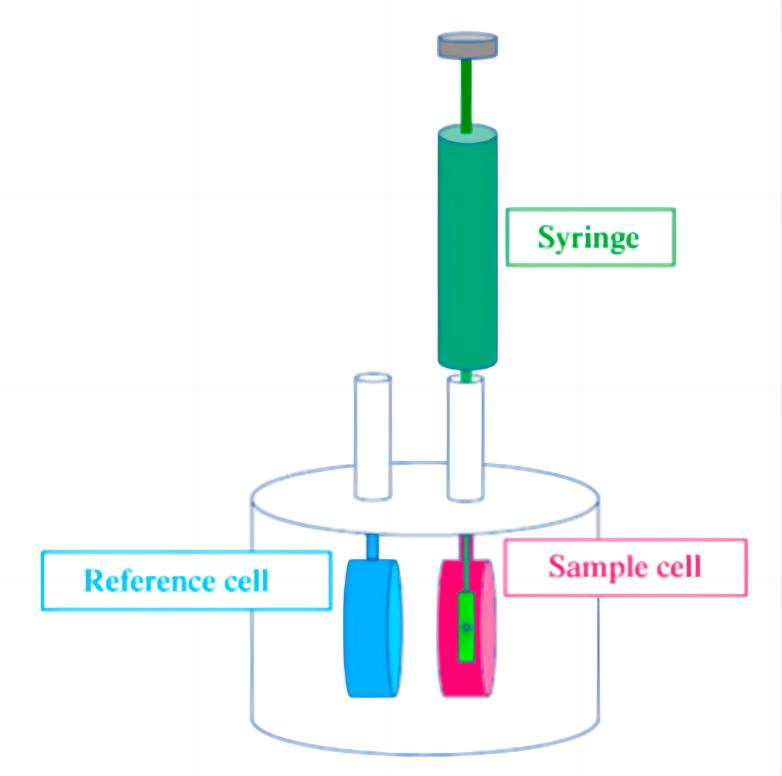Isothermal Titration Calorimetry (ITC)
Online Inquiry
Isothermal titration calorimetry (ITC) is widely used for the measurement of affinity and enthalpy of interactions between proteins and/or small molecules. Creative Proteomics offers efficient antibody drug characterization services based on isothermal titration calorimetry to help clients obtain complete thermodynamic parameters of antibody drugs. Our highly sensitive and robust ITC instruments continuously and accurately detect and record the calorimetric profile of a changing process, providing both thermodynamic and kinetic information in-situ, on-line and non-destructively.
Principles of Isothermal Scanning Calorimetry
Isothermal titration calorimetry is based on thermodynamic principles and is an analytical method in which a ligand comes into contact with a macromolecule at a constant temperature. The ITC instrument contains a reference cell and a sample cell, in which a dilute solution is added to the reference cell as a control, separated from each other by an adiabatic device. At a constant temperature, the drug solution in the syringe is titrated into the sample cell containing the target protein, and the two substances interact, releasing or absorbing heat proportional to the amount of binding. The ITC assay provides thermodynamic parameters of the tested biomolecule such as binding constants, number of binding sites, reaction enthalpy change, and entropy change.
 Fig. 1 Instrumentation of the typical isothermal titration calorimetry. (Srivastava, V. K. et al., 2019)
Fig. 1 Instrumentation of the typical isothermal titration calorimetry. (Srivastava, V. K. et al., 2019)
Our ITC-Based Antibody Drugs Characterization Services
ITC provides a simple and accurate method for quality control and critical property analysis of antibody drugs. Our ITC-based characterization services help customers quickly and efficiently determine a variety of parameters, such as antibody affinity (Ka), antigen binding heat, and antigen-antibody binding ratio, which can also be used to indicate antigen-antibody interactions in vivo and in vitro.
In ITC experiments, we titrate an antibody molecule into a solution of another interacting molecule at a constant temperature and record the heat released by binding in real time. Multiple titrations are performed sequentially, and the heat released or absorbed by molecular binding is directly proportional to the number of molecules bound; when the system reaches saturation, only the heat of dilution is observed. We plot the thermal effect of each titration against the molar ratio of the titrating and titrated molecules to obtain a binding curve. Our automated ITC equipment can complete the whole process of titration, data acquisition and analysis, and indirectly obtain the parameters such as Gibbs free energy and constant pressure molar heat fusion after software processing. Through these parameters, we can help our customers to obtain detailed information of antigen-antibody intermolecular reaction.
Advantages of Our Isothermal Titration Calorimetry Technology
- Analysis without labeling or modification.
- Ability to determine multiple thermodynamic binding parameters in a single experiment.
- Small sample dosage, no damage to sample structure, high sensitivity and accuracy.
- Wide range of detectable affinities.
- Fast detection and easy handling.
- No labeling or modification required for analysis.
Creative Proteomics' ITC solutions aim to aid antibody drug development by supplying researchers with essential data to ensure successful outcomes. Contact us to learn more about our service and we will be happy to serve you.
Reference
- Srivastava, V. K.; et al. Isothermal titration calorimetry[M]//Data processing handbook for complex biological data sources. Academic Press. 2019: 125-137.

 Fig. 1 Instrumentation of the typical isothermal titration calorimetry. (Srivastava, V. K. et al., 2019)
Fig. 1 Instrumentation of the typical isothermal titration calorimetry. (Srivastava, V. K. et al., 2019)